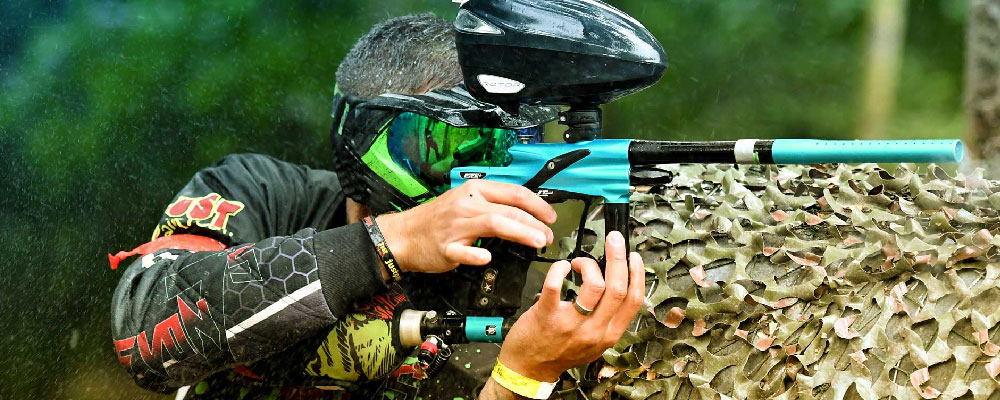
Playing in the UK
The games
There are hundreds of small walk-on and casual games in the UK and it has a strong scene. Larger or international level games include:
- North Versus South (Warped Sports)
- NvS is an international scale game with players from all over Europe. It's been around for 30 years, and it's built up a solid reputation. It's a good focus point for the UK paintball community.
- NvS is held at the beginning of May.
More event info is to come, including Mayhem, Speed Weekend and Warped Genesis series. Want to be included? get in touch and we'll prioritise adding the info.
The environment
Paintball is pretty popular in the UK. Standard scenario events have between 100 to 250 players, with the larger events often reaching into the 1000s. People play a mix of magfed and regular hopper, with a majority of regular hopper players.
Sites are varied. There are a lot of forest/countryside sites and often clubs have fairly advanced locations. There are also many UK military bases that are rented and used for special events. CQB and other specialist sites also exist, so there's plenty available.
There is no off-season, although the winter is a little quieter. Winter conditions can be -5°C to 15°C, with summer temperatures being between 15°C and 30°C. Rain is a definite risk, but woodland tends to protect against the worst of this.
Travelling to the UK
You can get to the UK easily by a number of methods, and each have their own advantages or disadvantages.
If you want to fly:
- Flying
- Flying can be the quickest way to get to the UK for many players. Check in can be complex and customs do not always let equipment through, even if regulations are followed. In particular, gas is risky. Airports have strict limits on luggage, including weight. A larger bag usually can hold your equipment, but you should be careful. Tickets are not flexible, and while the UK is a common venue, there are often no flights until the next day.
If you want to drive:
- The Eurotunnel
- The Eurotunnel is an excellent way to get into the UK. Check in and customs checks are very quick. The tunnel/train has very few limits on luggage, including weight. Assuming things are sensibly packed, you should find this easy. It is also possible to get flexible tickets. Even with specific tickets, the check-in can be fluid. Often you can get on an earlier or later train with no difficulty.
- You will arrive at Folkestone, which is directly on a motorway to the London. This is a direct route to most major motor networks.
- The train takes approximately 30 minutes, and it's common for the whole process to only take an hour.
- Ferry
- The Ferry is an also a good way to get into the UK. Check in and customs checks are quick, but you often get searched. There are a few limits on luggage, and gas bottles and markers should be registered and checked in. As above, assuming things are sensibly packed, this should easy. Ferries depart at specific times, and you cannot transfer, so you will need to arrive well in advance.
- You can get ferries from Holland, France, Belgium and Spain and will arrive on the South Coast. Typically, this is a 30m drive from the main motorways.
- The ferry takes approximately 2 to 3 hours from France. Holland and Belgium take 4-6 hours, and Spain takes 22 to 24 hours.
When driving, a common approach is to get a hotel near the crossing (either side) and then travel at an of peak time. Early morning or late night trains or ferry are much cheaper and less busy. Booking in advance helps with both hotel and transport prices. We recommend booking before February.
In many ways, the Eurotunnel is the best method. It's more regular, with more room for error. However it's often a little more expensive. You also must leave from France. Some larger teams often send a few through the Eurotunnel with all the equipment with the rest of the team flying over, splitting costs.
UK Driving Tolls and Charges
There are very few Toll Roads in the UK, and only a few toll areas. Check your route, but notable ones you may experience include:
- Dartford Crossing, on the way around London
- M6 Toll, near Birmingham (there is also a separate M6 Motorway with no toll)
Many cities have congestion or low emission zones, including airport cities such as London and Manchester. As always, check your route.
Payment
The UK uses GBP (GB pounds) or £. Most sites accept card, and it's common to not use cash onsite at all. We recommend you bring cash, but it's not vital.
Paintball and the law
The paintball industry uses the air weapons section of the Firearms Act 1968 to regulate the sport. Therefore, the Home Office does not consider paintball markers to be firearms because they fire frangible ammunition which breaks up on contact rather than inflicting a penetrating injury.
Paintball guns do not require a license if they do not fire above 12ft/lbs for a rifle-style (the typical style of most paintball guns) or not above 6ft/lbs for pistol types.